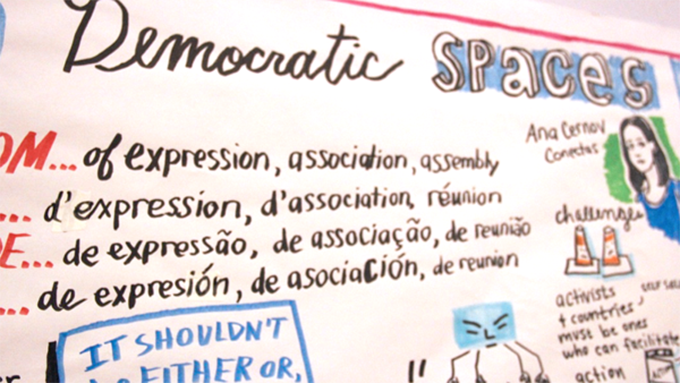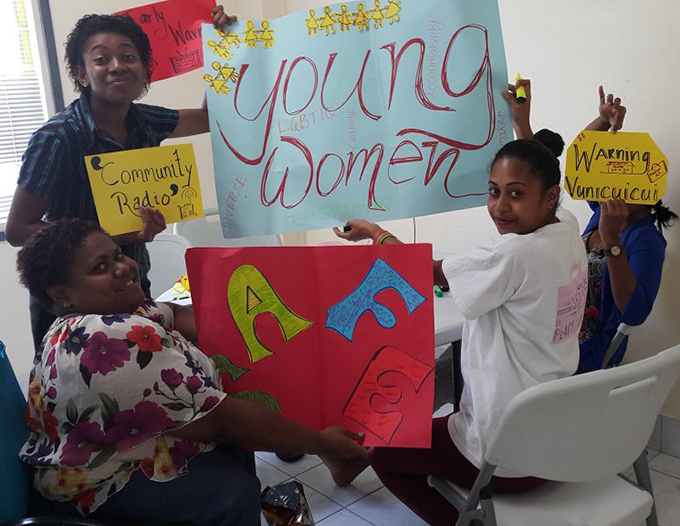COMMENT: By Sharon Bhagwan Rolls in New York
Pacific — and global — feminists are facing challenging times this week in New York with efforts to squeeze out NGO access to United Nations negotiations.
“Pacific feminists and women led groups are pressing for a CSW61 Agreed Outcome document that shows governments showing courage to change the inequalities within and between states, examining and addressing sustainable consumption and production patterns, and envisioning a changing world of work for women that is not toward concentration of wealth and corporate power that prevents governments from investing in public services and social protection necessary for women’s economic rights, but rather toward a just and equitable future for all, including women and girls,” says Noelene Nabulivou, political adviser of DIVA for Equality in the final days of the 61st session of the UN Commission on the Status of Women (CSW61) here in New York.
But the shrinking spaces for women’s human rights are glaringly obvious.
This year’s CSW has seen attacks on NGO access to the consulting process as the negotiations come to a close today.
According to the NGO CSW Committee as well as We Rise Coalition partners outside the negotiations on Wednesday, UN Security staff removed NGOs from the building after 6pm while negotiations continued late into the night.
CSW Agreed Conclusion negotiations were moved to the ECOSOC Chamber and Trusteeship Council Chamber twice this week. These meeting rooms are on the second floor which are off-limits to NGOs.
This has severely restricted NGO/government informal discussions, hampering their ability to support the progress of the negotiations.
Gains at risk
This is putting at risk the gains we have made for women’s rights, as Nabulivou explains:
“We see more governments making links between women’s work and climate change, and we now want to see language on implementation; and on what components are needed for just and equitable transitions to low carbon economies.
“We also are concerned for language to help address structural issues such as the grossly imbalanced global economic and financial system; and a growing automation of work impacting on women already at the bottom of deeply unequal global supply chains.”
Caroline Lambert of International Women’s Development Agency has raised issues of universal human rights, and inclusion of all women as central to leaving no-one behind:
“For too long, the CSW has failed to recognise the human rights associated with sexual orientation and gender identity.
“It’s time for the CSW to uphold these critical human rights.”
She added: “The indivisibility of human rights, particularly the vital intersection of labour rights with women’s economic empowerment, must be a strong part of the Agreed Conclusions. This text must place the ILO as a central pillar of the outcomes.”
In this global political climate, feminist networks and women human rights defenders, says Nabulivou, hope for a text that better responds to multiple forms of misogyny and patriarchal behaviour, authoritarianism, conservatism and violence that are being used to try to restrict women’s bodily autonomy, movement, sexuality and decision-making over their lives:
“It is important that the CSW61 Agreed Outcomes reflect a strong universal human rights framework.”
Pressing issues
Feminists across the world now look to the UN Secretary-General, UN Women and all member states to ensure that the remainder of the negotiations are open to civil society engagement, and that the agreed conclusions respond to the most pressing issues facing women’s human rights.
It is after all part of the critical legacy of collaboration between member states and civil society at the Commission on the Status of Women which have delivered many advances for women’s human rights, from the development of the Convention on the Elimination of All forms of Discrimination Against Women and its Optional Protocol; to the creation of the first International Year of Women as well as the adoption of the first Security Council Resolution on Women, Peace and Security.
Sharon Bhagwan Rolls of femLINKpacific is at the consultations as a representative of We Rise Coalition, led by four feminist organisations:
- Diverse Voices and Action for Equality (DiVA)
- femLINKpacific (femLINK)
- Fiji Women’s Rights Movement (FWRM)
- International Women’s Development Agency (IWDA)















































[…] in the middle of CSW61, UN Security Staff removed women NGOs from the building after 6pm while negotiations on the draft agreed conclusions continued late into […]
Comments are closed.